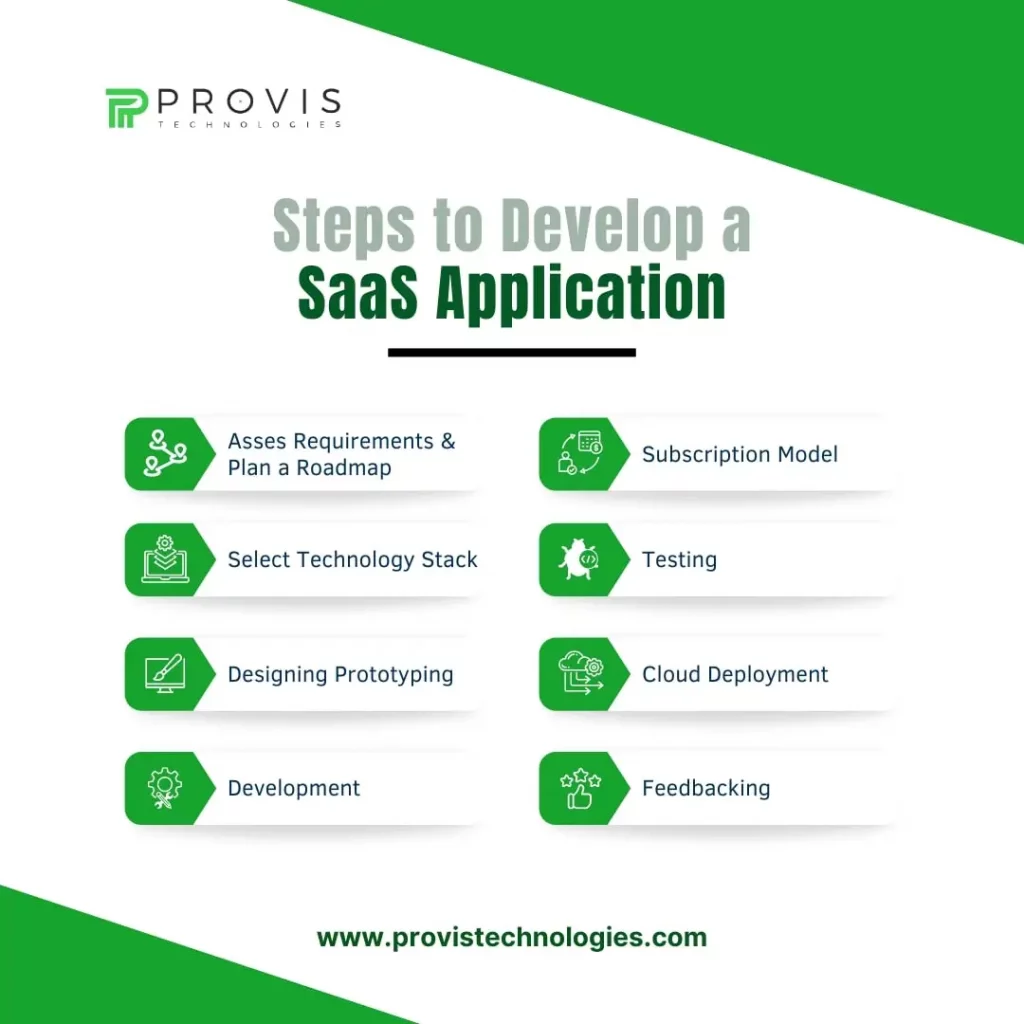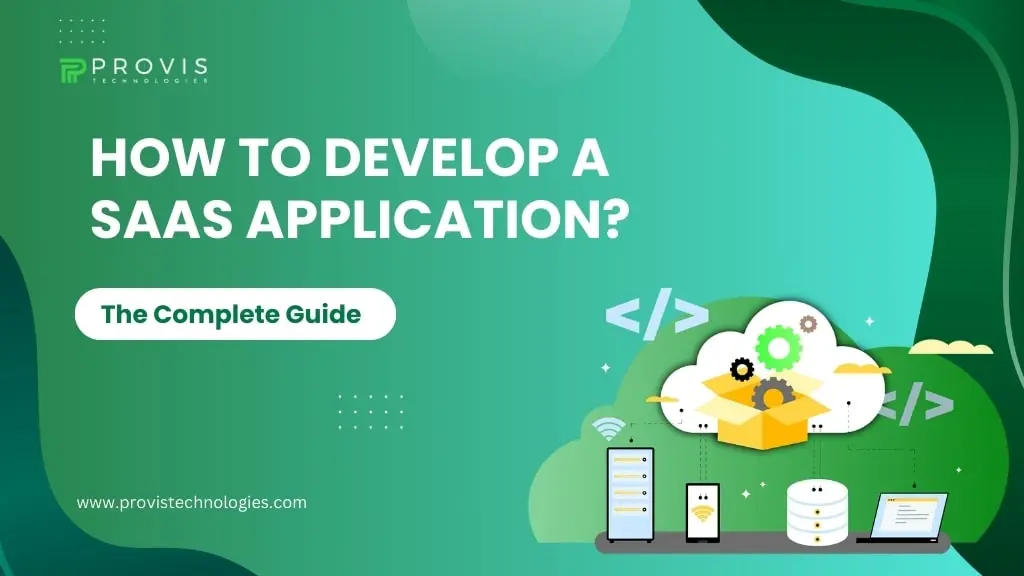Software as a Service or SaaS – is a modern approach of the IT industry to meet its application requirements. The list of benefits SaaS applications offer is quite lengthy, and that’s the reason the global SaaS market is expected to reach $317.55 billion by the end of this year, according to Fortune Business Insights. Today, we are here to see how to develop a SaaS application.
What is a SaaS App?
A SaaS app is a cloud-based software solution. In simple words, when software or an application doesn’t need to be installed locally, meaning in your device, but you can use it by accessing it through the internet – this is SaaS. For instance, you watch videos on Netflix, but do you have all those movies in your system? No. It means that Netflix is a platform that lets you access its content via the internet. You can go there and stream the movie. In return, you pay the yearly subscription to the giant OTT platform.
For instance, let’s assume that Netflix is not a SaaS application. Then, what you will have to do is you have to download each movie on your device to be able to watch it. That’s the difference between a SaaS application and a traditional application.
How to Develop a SaaS Application?
The first thing to do is the reason why you do it. So, in this case, you also must know the exact project plan, how you will do it, what you are expecting, the budget, and everything else. All in all, we are saying that before you get into the development process – assess your requirements and thoughtfully make a blueprint or a roadmap of the project. Moreover, this is the best time to develop a SaaS app.
Steps to Develop a SaaS Application

Step 1
Asses Requirements & Plan a Roadmap
Assess your requirements, which will be based on your goals. You must know your target audience, tools & technology, app features, team, and deadline. Once your roadmap is ready, you can begin with the SaaS app development process.
Step 2
Select Technology Stack
Pick up platforms & technologies you are comfortable with and hold expertise level. If you don’t have enough skills, hire SaaS app developers like Provis Technologies. Node.js, Angular.js, React.js, PostgreSQL, AWS, Flutter, and React Native are some of our suggestions for frameworks & platforms for backend, frontend, hosting, & app development.
Don’t Miss: 30 FAQs About SaaS Product Development
Step 3
Designing Prototyping
UI & UX – User Interface & User Experience has to be classy and one of the most crucial factors in any app’s success. You must be very thoughtful at this stage of development. Take proper time, research the market and your competitors – see what’s working and what’s not. Design proper user-friendly wireframes, mockups, and prototypes to see how the app will look once ready. Execute any feedback you get from your expert team members. UI will decide how your SaaS app will appear, and UX will be responsible for its functionality. And it’s your responsibility to make a good-looking and smooth-functioning app. Because that’s what only works in the real world!
Step 4
Development
You must be ready with designs, prototypes, figmas, & whatnot. So, if you really are, now is the time to start with the development. Based on the designs, it’s time to bring your project to life via coding. If you are a coding expert, well & great, otherwise hire one. Provis Technologies is one of the best SaaS app developers – you can connect with the agency to get a quote or help for your project.
Step 5
Subscription Model
Meanwhile, the app is being coded – you better finalize the payment model for your SaaS app. Since SaaS applications work on either a subscription or pay-as-you model – you must set things for your app at this point only to implement the same in the app and marketing tactics.
Step 6
Testing
Once the application is ready, conduct thorough testing. There are many types of app testing to check the app’s performance, reliability, functionality, and scalability. You must ensure that everything is top-notch in your SaaS app. Without performance, you will have no growth. And without scalability, businesses will avoid your app since there will be no future-proofing certainty.
Step 7
Cloud Deployment
Once your SaaS app is completed, it’s time to deploy it on the cloud. SaaS apps come with various advantages – cloud availability is one of them. More users can access your app from around the globe.
Also Read: The Future of E-commerce: Embracing SaaS Solutions
Step 8
Feedbacking
You are not done yet. Once the app is live, new users will come. New users mean new ideas and feedback. They say that the customer perspective is the most essential thing in business. They are correct because, ultimately, the end-user has to use the application. You have made it for them. So, wait a few weeks, collect the feedback, and keep improving the app until you start getting appreciated or stop getting poor reviews.
Tips for SaaS App Development
Remember these quick tips:
- Pay attention to modern features.
- Leverage AI.
- AI is reaching every corner – you must get it into your app somewhere. It will help your app’s functionality and help you in marketing too.
- Customer support – it plays a vital role in any service’s success. You must provide reliable support for your app.
- Competitive Pricing – keep prices based on market conditions.
- Get expert help if needed from AI & SaaS experts like Provis Technologies.
Must Know: Chatbots for B2B SaaS: Harnessing The Power of AI for Business Growth
Benefits of SaaS App
- Accessibility
- Scalability
- Flexibility
- Cost-Effectiveness
- Security
- Better Coverage
Bottom Line
Developing a SaaS app is a great idea because this is their time. Modern technologies like SaaS & AI are taking over and replacing the traditional methods. Follow the above steps to stay on track. If you need to, you can hire a SaaS development team or a SaaS app development agency like Provis Technologies. But do not compromise on the app quality. Remember, if you do it, do it well.
Written By
Author's Picks
- Optimizing SaaS Applications for the Cloud: Strategies for 2025
- 23/09/2024
- How to Build a Custom and Scalable AI SaaS Product | A Step-by-Step Process and Cost Estimation for Businesses
- 04/10/2024
- How Much Does It Cost to Build a SaaS Product?
- 26/10/2024
Categories
- AI for Startups
- AI in Web Development
- AI Integration
- AI Platforms
- AI Prompt
- AI Tools
- AI Trading Software
- Android App
- Android vs iOS Development
- Angular
- API
- API Development
- App
- app development
- App Idea
- App User Feedback
- Application
- Artificial Intelligence
- Audit Services
- Automotive Industry
- Awards and Recognition
- Business Consulting
- Business Website
- Chatbots
- CRM
- CRM for Financial Advisors
- Custom CRM
- Custom SaaS
- Custom Website
- Customer Service
- dashboard design
- Developing a Mobile App
- Digital Business
- E-commerce
- EMR Integration
- Finance
- Financial Advisors
- Financial Advisors
- GIT
- Health Insurance
- iOS App
- iOS App Development
- IoT Mobile App Development
- IoT Platforms
- IT Audit Services
- IT Consulting
- IT Strategies
- Java Development
- Laravel
- Lean Canvas
- Learning Management System
- Logistics Apps
- Mobile App Development
- MVP
- Native App
- News Aggregator Site
- OTT
- Outsourcing IT
- Payment Gateway
- predictive analysis
- Product Launch Strategy
- Progressive Web App (PWA)
- Prototype
- Recommender Systems
- Ruby
- SaaS
- SaaS Application
- SaaS Business
- SaaS Company
- SaaS Development
- SaaS Product
- SaaS Project
- Sales Funnel
- SEO
- Shopping Cart
- Software Development
- SSL and TLS
- Startup Checklist
- Technology
- Tetradic Color Scheme
- UI/UX Design Company
- Unit Testing
- User Flow
- User Testing
- Web Development
- Web Performance Optimization
- website Maintenance Services
- Website Migration Service
- Website Speed Optimization
- WooCommerce
- WordPress





